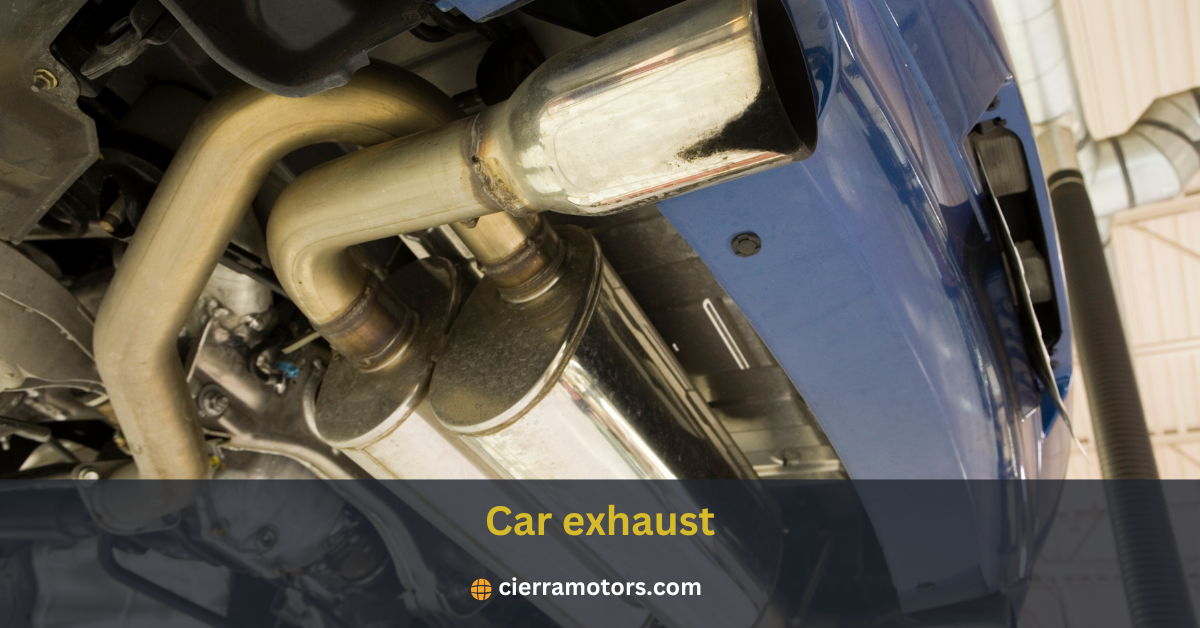For many car enthusiasts, how a car sounds is as important as how it looks and performs. The purr of an engine on a cold start, the throaty roar of acceleration, even the gentle hum of highway cruising — each sound can stir the soul and enhance the overall driving experience. If you’re one of the many who ask, ‘How do I make my car louder?’ this detailed guide is tailor-made for you.
Customizing your car’s sound is an art form that involves a blend of technical know-how, personal taste, and a respectful nod to the laws that govern vehicular noise. This blog will lead you through the intricacies of car sound customization, providing insights on how to increase the decibels while keeping your ears safe and legal.
Understanding Car Sound

Car exhaust can make your car louder
Before you can manipulate it, you must understand it. Car sound is a complex thing, influenced by many factors, including engine design, exhaust system configuration, the presence of a muffler, and even the materials used to construct the vehicle.
The Importance of Car Sound to Enthusiasts
Sound is an emotional language for automotive enthusiasts. It can be the auditory evidence of a car’s power or a reflection of the driver’s personality. A louder exhaust note can be incredibly satisfying, driving up your adrenaline and adding a muscular edge to your vehicle.
Legal Considerations for Modifying Car Sound
While there is no doubt about a growling engine’s allure, there are often strict laws related to vehicle noise pollution. Altering your car’s sound can have significant legal implications if not done in compliance with local regulations.
How To Make My Car Louder: Ways to Increase Sound
Several proven methods exist for cranking up the volume of your car’s sound system. From the basic upgrades to the more complex aftermarket parts, here’s how to make some noise, literally:
Upgrading Exhaust Systems
The exhaust system is vital in determining your car’s sound profile. Upgrading from factory exhaust parts to high-performance ones, like a cat-back exhaust system or performance mufflers, can enhance your vehicle’s auditory experience and boost its overall performance. For instance, installing a Borla S-Type Cat-Back Exhaust on a sports car can provide a deep, aggressive growl while improving horsepower and torque output.
High-Performance Exhaust Manifolds
Upgrading your exhaust manifolds is crucial for enhancing both power and sound in your vehicle. By opting for aftermarket headers, you can effectively decrease back pressure, resulting in a noticeable improvement in both the sound quality of your car and its overall performance. This upgrade is highly recommended for those looking to optimize their driving experience and enjoy a more powerful and exhilarating ride.
Resonators and Mid-Pipes
Upgrading resonators and mid-pipes is crucial for customizing your exhaust sound. Replacing these components with straight pipes or high-flow alternatives can enhance and amplify the sound output, providing your vehicle a more robust and aggressive tone. Because of their larger diameter and lesser restriction, these parts can increase the volume while minimizing the drone.
Installing a High-Performance Muffler
The muffler is designed to reduce noise levels, but high-performance mufflers are tuned to do this while also creating a more aggressive note.
Axle-Back or Cat-Back Systems
Enhancing your vehicle’s exhaust system by upgrading to an aftermarket axle-back or cat-back configuration can substantially impact your car’s sound quality and performance. These specialized systems are meticulously engineered to replace stock mufflers and exhaust pipes, resulting in a more robust, resonant sound profile while optimizing airflow for superior engine efficiency.
The installation of a performance exhaust system can amplify the engine’s growl and boost horsepower and torque output. By reducing exhaust back pressure and enhancing exhaust scavenging, aftermarket exhaust systems can improve overall engine performance. An example is the renowned Borla exhaust systems, known for their superior quality and performance gains across a wide range of vehicles.
Straight-Through Muffler Designs
Performance mufflers that offer a direct route for exhaust gases are frequently associated with increased volume levels, potentially amplifying the sound profile while maintaining compliance with legal noise regulations. This design choice can be attributed to the streamlined flow of exhaust gases, which reduces back pressure and enhances engine efficiency, resulting in a more robust engine performance.
In sports cars, such mufflers are favored for optimizing exhaust flow, thereby improving horsepower and torque output. Additionally, the enhanced sound produced by these mufflers can provide a sporty aesthetic appeal, appealing to automotive enthusiasts seeking a more aggressive exhaust note without compromising legal limits on noise levels.
Adding Sound Amplifiers
Amplifiers deliberately increase the volume of your car’s sound. They create additional engine noise and amplify it through the exhaust system.
Acoustic Amplifiers
The exhaust sound can be enhanced by adding add-on devices while maintaining optimal system tuning for peak performance. This modification is popular among car enthusiasts looking to amplify their vehicle’s exhaust note without compromising efficiency.
Installing a performance muffler or a resonator can deepen the exhaust tone, providing a more aggressive sound profile without sacrificing the exhaust system’s tuning precision.
Engine Noise Simulators
Simulators linked to the accelerator enhance the driving experience by adjusting the volume based on the driver’s actions, resulting in louder sounds for an exhilarating drive. The simulators amplify the engine noise when the driver presses the accelerator pedal further, creating a more immersive and exciting driving environment. This innovative feature adds a dynamic element to the driving experience, making it more engaging and enjoyable for the driver.
Tuning the Engine for a Louder Sound
An engine’s sound can be heavily influenced by its tune, which involves modifying the engine’s electronic control unit (ECU).
ECU Tuning
Modifying the ECU in your car post-purchase can alter fuel delivery and timing. This adjustment can impact various aspects, such as engine sound, power output, and the vehicle’s overall performance. By fine-tuning the ECU settings, a driver may experience increased horsepower and torque, resulting in a more responsive and dynamic driving experience.
Ditching the Air Silencer
Dampening the sound of the incoming air plays a crucial role in reducing noise levels. Removing it may result in a louder induction noise, which should be approached with caution to avoid causing any potential damage.
In a car’s intake system, the air silencer component is designed to muffle the sound of air flowing into the engine. Removing this silencer can amplify the noise generated during acceleration, affecting the overall driving experience.
Safety and Legalities of Louder Cars
It’s essential to ensure that your sound-enhancing modifications fall within the boundaries of the law. Before making changes, research and understand the specific noise regulations in your area.
Complying with Local Laws
Noise ordinances are laws in place in many regions to regulate sound levels. It is important to confirm the specific decibel limits allowed by law and any rules regarding modifications to vehicle noise.
In urban areas, noise ordinances are commonly enforced to maintain peace and reduce disturbances to residents. Failure to adhere to these regulations may result in fines or other penalties.
Safety Precautions
Sound vehicle enhancements can pose safety risks if done incorrectly, even beyond legal concerns. Prioritizing your vehicle’s structural integrity and performance is crucial when considering such modifications. For instance, altering the exhaust system to amplify sound may compromise the vehicle’s emission control system, leading to environmental pollution and potential engine damage.
Maintaining Your Car’s Sound System
Once you’ve achieved the perfect roar, it’s important to maintain it. Neglecting your sound system can lead to a loss in performance and an unpleasant sound.
Regular Maintenance Tips
Proper maintenance of your exhaust system is crucial for optimal performance and the durability of your sound upgrades. Regular care, such as cleaning and inspecting components, can prevent rust and corrosion, extending the lifespan of your system. Replacing worn-out parts promptly can prevent leaks and ensure efficient exhaust flow.
Troubleshooting Common Issues
Modifications of sound systems, such as upgrading speakers or installing a new stereo, can sometimes introduce new challenges. These changes might impact the overall performance of your vehicle’s audio setup. By promptly recognizing and addressing any issues that arise, you can potentially prevent more significant problems down the line, saving you from potentially costly repairs in the future.
Conclusion
Sound customization is a personal statement that extends your vehicle’s identity. It can transform an ordinary car into a head-turning machine. However, with this great privilege comes responsibility. Always consider the implications of your actions before modifying your car’s sound. Following the tips and advice in this guide can safely and legally amplify your car’s voice for a more fulfilling driving experience.
FAQs
How to make your exhaust louder?
You can make several modifications to increase the volume of your car’s exhaust, including adding a performance muffler, installing an engine noise simulator, tuning the ECU, and removing the air silencer. However, it’s important to consider safety and legal implications before making any changes.
Is it legal to modify my car’s exhaust sound?
The legality of modifying your car’s exhaust sound varies depending on your location. Researching and understanding the specific noise regulations in your area before making any changes is essential.
Is it safe to add sound amplifiers to my car?
Adding sound amplifiers can be safe if done correctly and with proper consideration for your vehicle’s structure and performance. It’s crucial to prioritize safety and follow proper maintenance procedures to prevent potential risks.
Can modifications impact my car’s overall performance?
Yes, modifications can affect your car’s overall performance, particularly if they are not done correctly or with proper consideration for the vehicle’s systems. It is important to research and understand the potential implications of any changes before making them.
How often should I maintain my car’s sound system?
Regular maintenance is essential for the longevity and optimal performance of your car’s sound system. It is recommended that worn-out parts be cleaned, inspected, and replaced regularly to prevent potential issues. So, it is best to follow a regular maintenance schedule per the manufacturer’s recommendations or consult a professional mechanic. However, if you notice any issues with your sound system, it’s important to address them promptly to prevent further damage.



Leave a comment